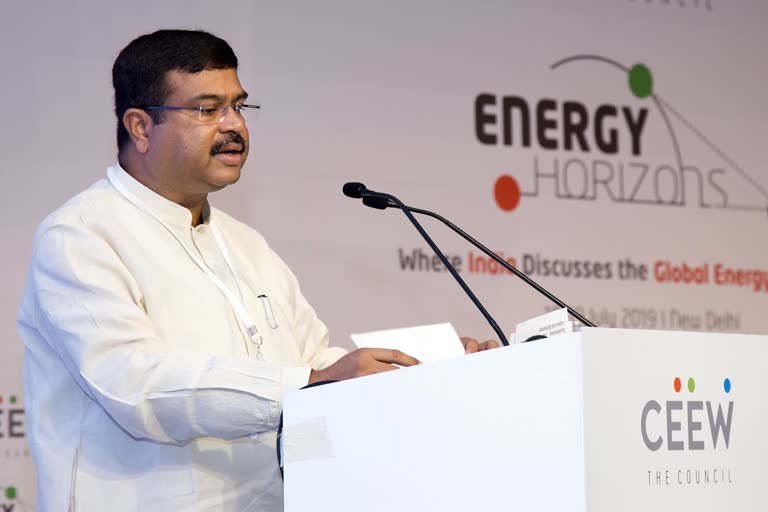New Delhi: Amid a push for electric vehicles, Oil Minister Dharmendra Pradhan on Friday said India will continue to rely on petrol and diesel for running automobiles and will need to expand its oil refining capacity by 80 per cent to meet the demand for the fuel in near future.
"EV is a priority but the incremental requirement of fuel will have to be met through a combination of (ultra-clean) BS-VI grade petrol and diesel, CNG and biofuels alongside EVs," he said at the Energy Horizon-2019 conference here.
The world's third-largest energy consumer would need a combination of cleaner diesel and petrol, compressed natural gas (CNG), biofuels and electric vehicles (EVs) for meeting its transportation needs, he said.
"Development of EV infrastructure and popularising through policy support would happen, at the same time a road map has to be provided in terms of the role of all other transportation solutions," he said.
While the country has sufficient capacity to refine crude oil and convert it into fuel such as petrol and diesel, it will need to raise it to meet the future requirement.
"In India, we have a current domestic refining capacity of 250 million tonne per annum. Recent studies have pointed out that even with an aggressive EV rollout plan, India would need 450 million tonne of refining capacity (by 2040)," he said. "Unless we pay attention to this demand growth, in another few years, we will have to start importing refined products along with crude."
Also, anyone investing in the refinery would need reasonable assurance that there will be demand for the economic life of the investment, he said.
Niti Aayog has reportedly proposed that after 2030, only electric vehicles should be sold in India. A panel headed by Niti Aayog CEO Amitabh Kant had earlier suggested that only EV (three-wheelers and two-wheelers) with an engine capacity of up to 150 cc should be sold from 2025 onwards.
The government think-tank believes that a move to allow sale of only EVs from 2030 will expand the scope of the clean fuel technology beyond two and three-wheelers in the country.
India consumed 211.6 million tonne of petroleum products in 2018-19. Of this, diesel consumption was 83.5 million tonne and petrol 28.3 million tonne.
All of the petrol and bulk of diesel is consumed by automobiles, including cars, buses and trucks.
Pradhan said with an estimated Gross Domestic Product (GDP) of USD 3 trillion by the end of this year, India is expected to become the fifth-largest economy in the world overtaking the UK. It is also likely to become the second-largest economy in the Asia-Pacific region by 2025.
Read more:Amit Shah to head ministerial panel on Air India sale: Sources
"India's energy consumption is projected to grow at 4.2 per cent per annum up to 2035, faster than all major economies of the world," he said adding the country's share of total global primary energy demand is set to roughly double to about 11 per cent by 2040, driven by strong economic development.
Energy itself, he said, is in transition with an increased shift towards electricity in primary energy consumption.
Renewable power as a source of energy is getting cheaper and it is the fastest source of energy both globally and in India.
India will, however, need to deal with volatility in the energy market due to geopolitics and play a significant global role, he said.
Energy geopolitics and the impact of factors beyond the locus of control have emerged instrumental in shaping the trends. Oil prices seem to be stable now, after rising about 37 per cent from December last year till May 2019.
"However, sanctions on Iran, Venezuela and uncertainty of supply from Libya, remain a concern," he said. "India will continue to play an active role in shaping the geopolitical landscape, and work towards safeguarding its crude supply, going forward."
In the last five years, the country's engagement with the global community has increased manifold and it has become an important influencer as a major consuming nation – highlighting the need for energy justice, he said.
"As India aspires to become a USD 5 trillion economy by 2024, capital outlay plan in the coming years across a number of areas, such as refinery upgradation, petrochemicals, pipeline, city gas network, LNG terminals and marketing network has to increase.
"This has a huge potential for direct and indirect economic impact as well as employment generation potential," he said.
With global energy demand centres shifting towards Asia, India is expected to be the bright spot in growth in the coming decades, he added. "The increase in the supply-demand gap in the energy sector is inevitable and will lead to greater innovations and investments in the ongoing energy transition."
According to Niti Aayog, 100 per cent EV sale by 2030 can reduce India's import dependence by a big margin. A joint study by Niti Aayog and Rocky Mountain Institute, USA suggests that India can save 64 per cent of anticipated road-based mobility-related energy demand and 37 per cent of carbon emissions in 2030 by pursuing a shared, electric, and connected mobility future.
India is currently 83 per cent dependent on imports to meet its oil needs. Petrol demand is witnessing double-digit growth rate, while diesel demand is rising by 5-6 per cent on the back of increasing automobile base.
The country spent USD 112 billion (Rs 7.83 lakh crore) on importing oil in 2018-19 and a part of this can be cut with a complete switch to EVs, according to Niti Aayog.



